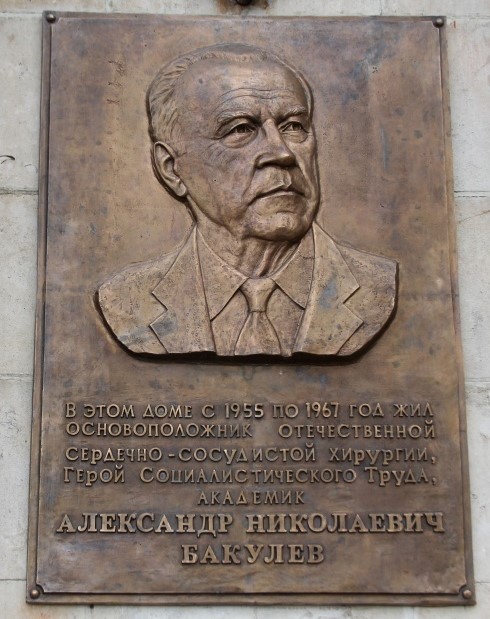Aleksander Nikolaevich
Bakulev
1890-1967

Aleksander Nikolaevich Bakulev was a Soviet surgeon scientist, one of the founders of cardiovascular surgery in the USSR, Doctor of Medical Sciences, Professor, Academician of the USSR Academy of Sciences, Academician and President of the USSR Academy of Medical Sciences, Honored Scientist of the RSFSR. He was born in the village of Nevenikovskaya, the Sloboda district, the Vyatka province, in a peasant family. In 1911 after finishing the gymnasium, he entered the medical faculty of Saratov University. In 1915 he was released by a doctor and sent to the Western Front. For almost three years he served as a junior regimental doctor in hospitals. In 1918 he received a medical degree from Saratov University and was drafted into the Red Army. In 1922, after demobilization, he returned to Saratov, worked as a resident, then as an assistant at the hospital surgery clinic of S.I. Spasokukotsky. The turning point in Bakulev’s life was 1926. His teacher S.I. Spasokukotsky, who moved to work to Moscow at the Department of Faculty Surgery of the 2nd Moscow University, invited Bakulev. Here he worked as an assistant, associate professor, second professor, defended his PhD (1935) and doctoral (1939) dissertations. Continuing the research started by S.I. Spasokukotsky, Bakulev studied purulent diseases of the pleura, performed new bold operations, removed a mediastinal tumor (1930), performed surgery for adhesive pericarditis (1935). For the first time in the USSR, he removed a lung affected by chronic suppuration from a patient (1945). Bakulev’s monograph “Pneumonectomy and lobectomy” (1949) opened the way for Soviet doctors to radical lung surgery. For the development and implementation of these operations into medical practice, he was awarded the Stalin Prize (1949). In 1939-1941 he was the head of the hospital surgical clinic of the 2nd Moscow Medical Institute, and in 1943 he headed the Department of Faculty Surgery, where he worked until the end of his life. Since the beginning of the Great Patriotic War Bakulev was the chief surgeon of the Reserve Front, and then at the same time the chief surgeon of evacuation hospitals in Moscow. In 1941-1953 he was the chief surgeon of the medical and sanitary department of the Kremlin. During the Great Patriotic War Bakulev published a series of works devoted to the surgical treatment of gunshot wounds of the spine and spinal cord, brain abscesses. He put forward a bold proposal for that time about the radical treatment of traumatic brain injuries, regardless of the time that has passed since the injury. He made a major contribution to the development of neurosurgery. It was Aleksander Nikolaevich Bakulev who developed and applied encephalography and ventriculography, a method of treating brain abscesses with repeated punctures with filling the abscess cavity with air (1940), performed operations of drainage of the arachnoid space with dropsy of the brain by omentopexy, as well as removal of the abscess with a capsule followed by a blind suture. He was also a pioneer of the use of intubation anesthesia in the USSR. In 1948 he was elected a full member (Academician) of the USSR Academy of Medical Sciences, in 1958 – Academician of the USSR Academy of Sciences. On September 24, 1948 Aleksander Bakulev performed the first operation in the country for a congenital heart defect – non-infection of the Botall duct. In 1957 he performed the first operation for mitral valve stenosis. In 1957 he performed an operation for mitral valve stenosis – a closed comisurotomy. In 1959 an operative method for the treatment of valvular pulmonary artery stenosis was developed. Aleksander Bakulev put forward the idea of turning off the right heart from the circulation during tetrad Fallot by creating a cavopulmonary anastomosis. This idea was implemented in 1956 by Bakulev’s student E.N. Meshalkin. In 1962 Bakulev performed a correction of mitral insufficiency. For the first time, heart sounding and angiocardiography began to be used in his clinic. Bakulev was awarded the Lenin Prize in 1957 for the development and implementation of surgical methods for the treatment of acquired and congenital heart defects and major vessels. In 1955, Aleksander Bakulev organized the Institute of Thoracic Surgery (now it is the Bakulev Institute of Cardiovascular Surgery).
Address: Moscow, Kudrinskaya pl., 1

